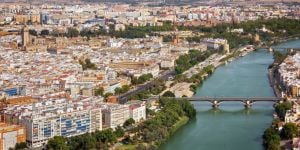Anyone understand the "Cuota" on water Bills?
Make your relocation easier with the Spain expat guide

Working in Tenerife
Are you looking for a job in Tenerife? While there are certainly opportunities, especially for fluent Spanish ...

The work culture in Seville
With late breakfasts and long lunches, Seville's work environment will most likely be very different from what ...

Developing your social circle in Seville
For many people, building a new circle of friends is one of the most daunting aspects of being an expat. Missing ...

Sports in Seville
Seville is an active city with a lot to offer sports enthusiasts, from fitness centers and organized sports to ...

The labor market in Seville
In addition to the sunshine, slow pace of life, and all the other benefits of living in a culturally rich ...

Tax in Alicante : Get to know SUMA
Get to know SUMA

Internet in Spain
Whether for work or play or keeping in touch with friends and relatives abroad, getting online will most likely be ...

Working in the Canary Islands
The Canary Islands is Spain's southernmost autonomous community, an archipelago in the Atlantic Ocean, more ...



